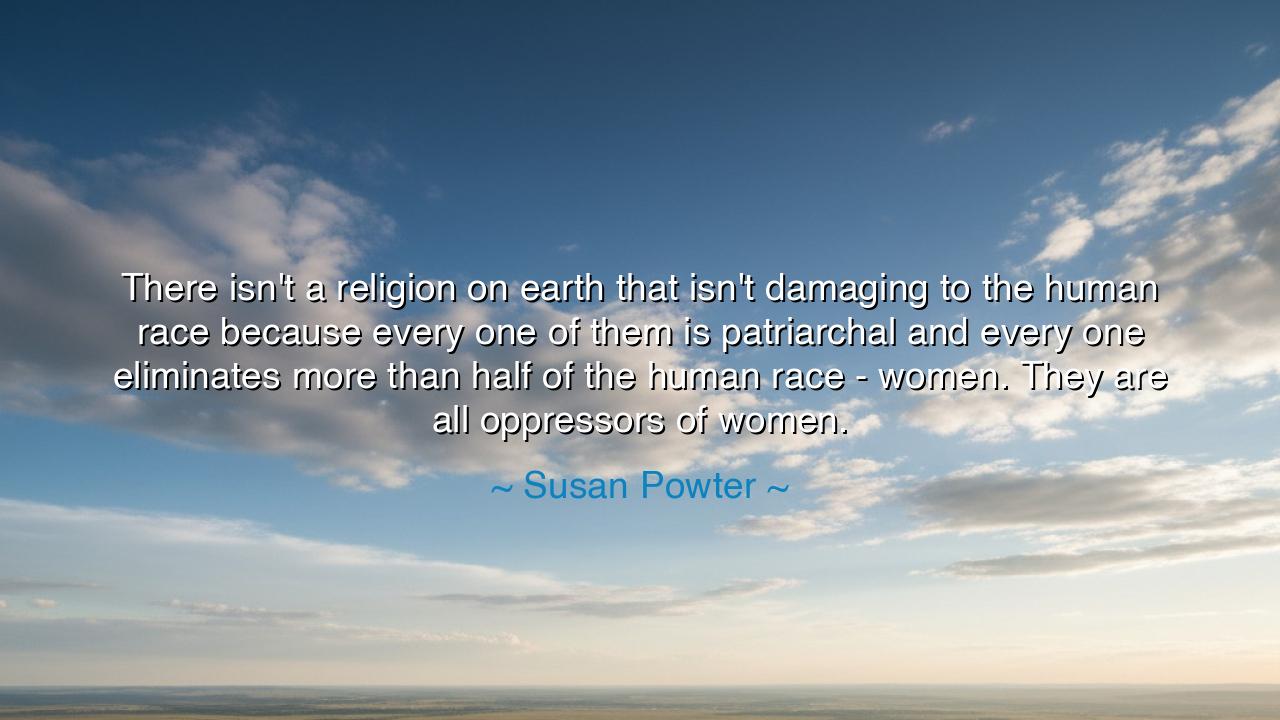
There isn't a religion on earth that isn't damaging to the human
There isn't a religion on earth that isn't damaging to the human race because every one of them is patriarchal and every one eliminates more than half of the human race - women. They are all oppressors of women.






In the grand sweep of history, where the voices of the oppressed often go unheard, the words of Susan Powter ring out with stark clarity: "There isn't a religion on earth that isn't damaging to the human race because every one of them is patriarchal and every one eliminates more than half of the human race - women. They are all oppressors of women." These words stir the soul, challenging the very foundations of patriarchy and religion as institutions that have long marginalized and silenced the voices of women. Powter’s critique is not a simple attack, but a call to examine the role of religion in shaping societies, often at the expense of women’s rights and their place in the world. It is a call to recognize the historical and systemic oppression that has endured under the guise of divine authority, demanding that we confront the inequalities that persist even in our most sacred traditions.
From the earliest days of human civilization, religions have often been structured in ways that place men at the center, with women relegated to secondary roles. The very word patriarchy reflects a system of rule by fathers or men, a system where women were treated as property or subordinates. In many ancient cultures, religious teachings served to reinforce this hierarchical structure, limiting women’s power, autonomy, and freedom. Whether through the writings of the Bible, the doctrines of Islam, or the teachings of Hinduism, women have often been cast as the “other,” excluded from positions of authority, decision-making, and spiritual leadership. These practices were not merely social customs; they were sanctioned by religion—seen as divinely ordained structures meant to govern the human experience.
Consider the example of the Christian Church during the medieval period, where women were forbidden from taking positions of leadership within the church. The very foundation of Christian doctrine, as established by Saint Paul, relegated women to subservient roles in both spiritual and domestic life. The apostle’s famous instruction in 1 Timothy 2:12, “I do not permit a woman to teach or to assume authority over a man; she must be quiet,” became a cornerstone for the exclusion of women from the highest offices in the Church. This patriarchal structure persisted for centuries, with women excluded from the clergy, denied the ability to preach, and often portrayed as morally inferior to men. Such teachings helped perpetuate the oppression of women, casting them as passive recipients of divine truth, rather than as active participants in spiritual life.
The story of Joan of Arc provides a powerful example of the conflict between religion and the agency of women. A young peasant girl who believed she was chosen by God to lead the French army, Joan’s visionary mission was dismissed by the male clergy and political leaders of her time. Her trial and execution by the Church—accused of heresy and witchcraft—highlight the inherent patriarchy within religious institutions. Despite her undeniable leadership and faith, Joan was ultimately condemned because her actions defied the gender norms imposed by religion. Her story is a testament to the harsh realities that women have faced when they sought to assert their spiritual and political power, only to be met with the silencing force of religious institutions.
Similarly, in the Islamic world, women have been historically marginalized by both religious interpretations and patriarchal norms. Though the Quran itself speaks of the equality of men and women in the eyes of God, centuries of male interpretation have led to laws and cultural practices that restrict women's rights. The practice of veiling, the restrictions on women's movement, and the denial of their participation in public life are all rooted in patriarchal interpretations of religious texts. Women like Malala Yousafzai, who have fought for the right to education, have faced fierce resistance from traditional religious communities that view female empowerment as a threat to the patriarchy. In this light, Powter’s assertion that religion has often been an oppressor of women rings true in the face of countless historical and contemporary examples.
Yet, even as we reflect on the dark chapters of religious history, we must also recognize the resilience of women in the face of such oppression. Throughout history, women have challenged patriarchal structures and fought for their right to equality and agency, sometimes within the context of religion and other times in spite of it. From Hildegard of Bingen, the medieval mystic and theologian, to Amina Wadud, a contemporary Islamic scholar, women have reclaimed their spirituality and asserted their place within religious traditions, challenging the patriarchy from within. These women remind us that faith and empowerment are not mutually exclusive, and that the divine can be experienced in ways that affirm the dignity and equality of women.
The lesson of Powter's words, then, is a call to action—to not only acknowledge the historical role that religion has played in the oppression of women, but to actively work to transform these institutions. We must challenge patriarchal interpretations of spirituality, demand equal participation for women in all religious spheres, and ensure that faith is a force that liberates rather than subjugates. The divine truth we seek must be one that honors the equality of all people, regardless of gender. In our own lives, let us reflect on the religious traditions we uphold and ensure they reflect the highest values of justice, equality, and compassion for all people, particularly for the women who have been silenced for far too long.






AAdministratorAdministrator
Welcome, honored guests. Please leave a comment, we will respond soon